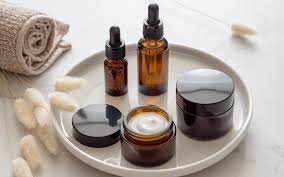
Mineral Oils in Skin Care
Mineral oils are petroleum-based saturated fats primarily used in skin care products for their hydrophobic properties that keep water from passing through the mineral oil.
They are extremely effective in preventing trans-epidermal water loss (TEWL), so are often found in occlusive moisturizers meant for use on the face.
They are effective emollients and occlusive ingredients.
Mineral oil has become less popular in the 21st century as people grow increasingly conscious of their carbon footprints.
If you do choose to use products with mineral oils in them, there are a number of great options depending on your Baumann Skin Type.
What is mineral oil?
Mineral oils form a coat on the skin’s surfaces that prevents permeation of water through the skin’s epidermis.
Mineral oils found in skin care products are composed of saturated fatty acids.
They are derived from petroleum, like petrolatum and paraffin.
They are called mineral oils and not “petroleum oils” because medical terminology was not always standardized; the name mineral oil was likely born as a marketing tool.
Because of vagueness of the phrase “mineral oils,” many other names are used to describe individual mineral oil products or the group of ingredients as a whole.
Some common ways to see mineral oil products referred are (1):
Heavy mineral oil
Light mineral oil
Liquid paraffin
Liquid petrolatum
Mineral oil mist
Paraffin oil
Petrolatum liquid
Petrolatum oil
Petroleum jelly
White mineral oil
White oil
Take the Quiz
Is mineral oil used in skin care?
Mineral oils have been used for decades in skin care because they are cheap, effective, colorless, odorless, and easy to formulate in skin care products.
Petroleum- based ingredients, such as petrolatum and paraffin, are considered by some to be too inelegant for use skin care products because they are thick and greasy to the touch.
are mineral oils safe for face
Can you use mineral oil on your face?
Whether mineral oils are safe for your face depends on the grade of the oil. Mineral oils graded for use in cosmetics are not comedogenic and can be used on the face.
If your skin is acne-prone, mineral oils might not be recommended for your face, because although mineral oil is not comedogenic, it can hold sebum, dirt, silicones, and sunscreen in the hair follicles leading to comedones.
You can use mineral oil on your face if you need a good, affordable, hydrating moisturizing ingredient, but there are many other natural oil options.
Find out if mineral oil containing products fit in your custom Baumann Skin Type regimen.
Is mineral oil good for your skin?
Mineral oils have been used for hundreds of years due to their significant occlusive and moisturizing properties.
Petrolatum, one of the most common mineral oils in skin care, is 170 times more effective at stopping water loss from the skin than olive oil is (4).
Keeping hydration in the skin is a very important part of any dry skin care regimen, so mineral oils can be extremely valuable ingredients in skin care.
If mineral oils are right for your skin type, they combine well with retinoids, aiding in the absorption of ingredients like retinol through occlusion.
One study found that an emulsion containing mineral oil prevented evaporative water loss more effectively than multiple common linoleic acid based emulsions. (19)
petrolatum
Which are the most common mineral oils?
The two most common mineral oils used in skin care are
Paraffin
Petrolatum
Dangers of mineral oil
Since mineral oils are derived from petroleum, many people are concerned it poses risks in skin care, particularly as a carcinogen; this is just a myth. (23)
The only universal drawback of using mineral oil products is that petroleum is not a sustainable resource and has a large carbon footprint.
The biggest danger of using mineral oils in skin care is that they might not fit into your custom skin care regimen!
Is mineral oil comedogenic?
Cosmetic grade mineral oils are absolutely not comedogenic. However, their occlusive properties can hold comedogenic substances like sebum on the face leading to clogged pores.
This is why you should wash your face before applying a mineral oil product in the am and wash the face thoroughly at night.
Industrial grade mineral oils are comedogenic on the skin,
Certain industrial grade mineral oils are listed as comedogenic ingredients to fulfill regulation requirements, but are not actually used in skin care products.
A 2005 study suggests that even though industrial grade mineral oil may be comedogenic, cosmetic grade mineral oils are positively non-comedogenic (18).
do mineral oils cause cancer
Do mineral oils cause cancer?
Mineral oils do not cause cancer on the skin, not even on thin, sensitive skin areas like the lips.
No definitive links with cancer have been found in uses of cosmetic or food-grade mineral oils.
One study shows that even when mineral oils were consumed orally at 2000 times the accepted daily levels, rats were no more or less likely to develop cancerous tumors than a control group. (3)
With all that being said, it is somewhat possible mineral oil based products may concentrate beams of light, the same way a mirror might, onto the skin beneath.
Hypothetically, this could expose skin to more potent UV rays than normal, which could potentially lead to sun damage and skin cancer, however no studies support this concern.
The bottom line on mineral oil and lip cancer: If you choose to wear a mineral oil containing lip balm in the sun, apply a lip sunscreen on top to protect your lips.
Are mineral oils safe for use in skin care?
Cosmetic grade mineral oils are completely safe for use in skin care.
The EWG rating for petrolatum, one of the two most common mineral oils in skin care, is listed as “1-4, depending on usage.”
That rating means it is considered completely safe in some forms, and fairly unsafe in other forms. The difference is whether it is a cosmetic or industrial grade mineral oil.
Only use skin care products with cosmetic grade mineral oil. Stick with reputable skin care brands!
coconut oil vs mineral oil
Coconut oil vs mineral oil
Both coconut oil and mineral oil can be comedogenic or not depending on how they processed.
While both are used as occlusive ingredients in moisturizers, coconut oil contains unsaturated fatty acids which help the oil absorb into the skin while mineral oils have saturated fatty acids that stay on the skin’s surface.
Coconut oil is mostly composed of saturated fats, but contains a small concentration of unsaturated fatty acids which allow it to somewhat permeate phospholipid bilayers.
Both oils to prevent trans-epidermal water loss (TEWL) helping skin hold onto water and stay hydrated.
Mineral and coconut oil in hair care
One study finds that in terms of hair care products coconut oil is vastly superior to mineral oils or even sunflower oil. (2)
The fatty acids in coconut oil bind more easily and effectively with proteins in hair, while mineral oils show practically zero affinity for hair proteins by comparison.
Some studies have suggested that mineral oils are terrible for protecting the hair and skin from UV damage, they can intensify the suns rays which can result in worse damage (like a mirror).
Coconut oil reduces loss of proteins in hair much more significantly than mineral oil, which hardly helped with protein loss at all.
Coconut oil has high concentrations of lauric fatty acids, which bond easily with and hydrate hair proteins.
Mineral oil is a saturated fat and does not easily bond with proteins.
When considering hair care products, keep in mind the differences between mineral and coconut oils. You may not need to hydrate your hair, which means in some cases coconut oil might not be a better choice than mineral oils. What is best for you depends on your personal hair care concerns.
mineral oil for dry skin types
Mineral oil for dry skin conditions
Moisturizers that contain mineral oils can be great for dry skin as parts of a comprehensive dry skin care routine.
If you have eczema, using a moisturizer with mineral oils can aid anti-inflammatory or antioxidant ingredients absorption into skin.
Mineral oils serve a similar function in products designed to treat psoriasis.
Occlusives like mineral oils are versatile in dry skin care regimens, and work well with any other in care products that benefit from occlusion (also known as skin slugging).
Mineral oil for acne
As an occlusive category of oils, use with acne is not ideal.
Putting certain oils on the face with acne can lead to worse acne depending on your skin type.
Any major changes in acne skin care regimens should be approved by your dermatologist, because mineral oil affects the efficacy of acne medications.
There are plenty of products considered safe for use with acne, shop by your Baumann Skin Type to find the best ones for you!
Take the Quiz
mineral oil products
Which types of skin care products contain mineral oils?
Mineral oils are used in many types of skin care products for their various beneficial properties.
They are found in many moisturizers because they are good occlusive ingredients, used in treatments like “skin slugging.”
Sunscreens should not be formulated from mineral oils.
Holding exfoliants and other hygienic ingredients against the skin makes them great ingredients in cleansers.
Lip balms use mineral oils to hold moisture on the lips and aid in the absorption of ingredients like humectants which make your lips feel moist.
Many skin care products containing mineral oils need to be washed off after applying; the timing depends on your custom skin care regimen.
To find out what kinds of mineral oil products might work for your skin care regimen, be sure to shop by your Baumann Skin Type!
Here are some of the best skin care products containing mineral oils:
Thanks for checking out this blog on mineral oils. To make sure mineral oils are right for your skin, and to get a full regimen recommended to you for free, take our skin type quiz by clicking the button below!


